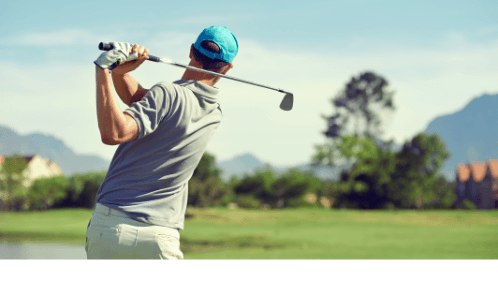Golf Rehab
Played individually, it is commonly mistaken for a low-impact sport. The explosive nature of the golf swing can place a tremendous amount of stress on the body resulting in an acute injury. On the other hand, the sport’s repetitive nature also has the potential to lead to an overuse injury. You don’t have to be a professional to experience some of the most common injuries in golf. Even casual golfers can sustain injuries; however, many of these injuries can be prevented with golf rehab.
REASONS INJURIES OCCUR:
- Rotational Stresses Placed on the Spine
- Traumatic Force to The Body Resulting from a Poorly Executed Swing
- Overuse And Over-Practice
- Poor Swing Mechanics
- Not Warming up the Muscles Properly
MOST COMMON INJURIES FOR GOLF REHAB TO HELP:
- Back Pain – Rotational stresses of the golf swing compounded with the bent-over stance and repetitive motion can place considerable pressure on the spine and muscles. Back pain in golfers might be mechanical (joint-related) or disc-related, arthritis-related, or caused by a stress fracture, among other possible causes.
- Elbow Tendonitis – Tendonitis (irritation and inflammation of a tendon) is the most common condition affecting the elbow. It is frequently referred to as “tennis elbow” (injury to the outer tendon) and “golfer’s elbow” (injury to the inner tendon). Repetitive motions, range of motion limitations, muscle weakness and imbalance, and faulty swing mechanics all contribute to the development of elbow tendonitis.
- Knee Pain – Rotation through the pelvis and hips is required with every swing of the club. These motions transfer rotational stresses to the knees stresses that the knees must withstand to maintain contact with the ground. This repetitive action can result in ligament sprains or muscle strains and can contribute to or aggravate existing arthritis. Extreme force placed on the knee can result in torn ligaments.
- Rotator Cuff/Shoulder Pain – Injuries to the rotator cuff (the muscles responsible for stabilizing the shoulder joint) can be sustained through traumatic force resulting from a poorly executed golf swing (i.e., hitting a root or rock, taking a deep divot, or from overuse). Common shoulder injuries include rotator cuff sprains, tendonitis, tears, impingement syndrome, acromioclavicular joint arthritis, and glenohumeral instability.
- Wrist Injuries – There’s a high risk of wrist injury as a result of the high velocity of the club at the top of the back swing and during impact, as well as the repetitive nature of the swing. The most common golf-related wrist injuries are de Quervain’s tendonitis, flexor carpi ulnaris tendonitis, flexor carpi radialis tendonitis, and extensor carpi ulnaris tendonitis.
- Hip Injuries – The hips are particularly vulnerable to injury due to the great deal of twisting and rotation of the hips and pelvis during the golf swing. This region of the body must efficiently transmit power from the lower body into the upper body and ultimately to the club head in the effective golf swing. As a result, the hips are subjected to rotational and shear forces that can result in injuries similar to those found in the shoulder. These common injuries include arthritis, muscle/ligament strain/sprains, and labral tears.
WE ARE HERE TO HELP:
As experts in the science of movement, our physical therapists can give you golf rehab and identify and remediate range of motion limitations, muscle weaknesses and imbalances, and incorrect or inefficient swing mechanics that may leave you susceptible to injury or prevent reaching your potential. By re-introducing the various shots and swing motions in a controlled and organized fashion via a “Return To Sport Program” the risk of complications and the time away from the links are minimized.
For more information, Contact us at Beverly, Bridgeport, Lincoln Park, Northwest Side Chicago, Glenview, Evanston, & Oak Lawn, IL centers.



